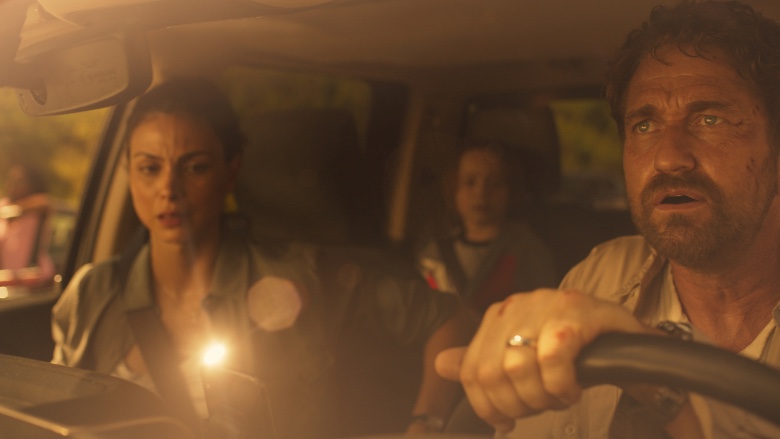
Director Ric Roman Waugh comes to filmmaking from the world of stunts, having been in that world — later joined by younger brother Scott Waugh (Act of Valor) — since the ‘80s. Waugh retired from stunts in 2001 to direct the action-thriller In the Shadows with Matthew Modine but then his 2008 prison film Felon, starring Stephen Dorff and Val Kilmer, got him more attention as a filmmaker who could imbue drama and characterization into the action.
Waugh teamed with Dwayne Johnson for the real-life crime-thriller Snitch in 2013 before making a second prison-crime film, Shot Caller, with Nikolaj Coster-Waldau from Game of Thrones in 2017. A major turn for Waugh came when he joined actor Gerard Butler for last year’s Angel Has Fallen, the third movie in his franchise with Morgan Freeman that already has a fourth movie in development, also with Waugh helming.
Waugh’s second film with Butler, Greenland, is now available in North America via POD after receiving an international theatrical release. It’s a very different kind of disaster flick about a giant comet heading straight toward Earth with Butler playing John Garrity, an engineer who receives a Presidential message that he can bring his wife Allison (Morena Baccarin from Deadpool) and son Nathan (Roger Dale Floyd) to an airbase where they’ll be taken somewhere to be safe. As the family tries to get to safety, they experience all sorts of hurdles that literally separates them, so that they have to find one each other if they’re going to survive an extinction-level event heading towards Earth.
As with Waugh’s other films, character always comes first, so even if Greenland does offer some of the big visual FX set pieces you’d expect from comets destroying things, it never loses sight of that central family at its core.
Waugh and Butler are now two-for-two with Greenland, and they’re keeping that working relationship going with their next film, Kandahar, which begins filming in 2021, before they get back into making a sequel to Angel Has Fallen.
Below the Line got on Zoom with the normally Austin-based Waugh a few weeks back for the following interview. It began with us discussing the decision in October for Greenland to skip North American theaters and go straight to VOD. Even so, the movie had already opened theatrically in Saudi Arabia, where the filmmaker was prepping for his next movie with Butler, Kandahar, which you can read more about in our previous Back to Work column. That’s where our conversation begins…
Ric Roman Waugh: Greenland was a movie that I was really excited about with Dolby Vision, and IMAX wanted it as well, but it’s the world that we live in. I think STX did the right thing with the way that we’re going to go out now, because we could have been lost in the ether with anybody, and who wants to do what Tenet or even this last movie just did — the Liam Neeson — I mean, that would be horrible. More people get to see it, and really get their fingers on it then great.
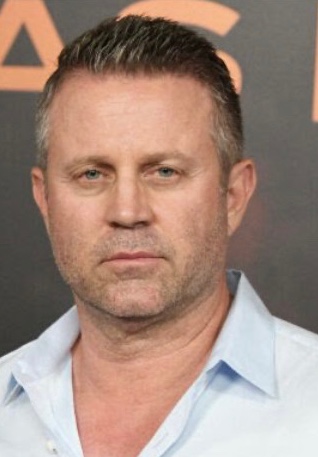
Below the Line: There’s definitely more people at home watching stuff. The problem is that there’s also a lot more stuff being thrown out there each week to compete with that stuff. We spoke last year but this is the first time we’re speaking for Below the Line where we focus more on craft and crew, so if you want to get nerdy and talk about lenses and lighting, we can do that.
Waugh: You’ll love what we’re doing for Kandahar, because I’m working with Khalid Mohtaseb, who I think will be the next Chivo or Greg Frazier, a phenomenal DP, New Yorker, and boy, he just brings a whole new thing, so I’m really excited about this journey.
BTL: I always go back to our previous interview to see where we left things off, but it’s basically now been one year since Angel Has Fallen and the gaps between movies gets shorter and shorter.
Waugh: Yeah, we just keep rolling. We’re shooting in February already.
BTL: So Greenland was finished before COVID hit in March, I presume.
Waugh: No, so we filmed it last year, last summer. We cut it — Director’s Cut was finished — we tested it, locked picture, everything. When I just had started the mix is when literally Los Angeles and California went into formal lockdown. We got stuck for the next three months having to finish everything remotely. 175 visual effects shots still. Had to go back three months later. We literally walked into Technicolor at Paramount, and the mix stage was literally where I left the pens, bottles of water, notepads. Nothing had moved. It was crazy. Everybody really kind of dug in. The movie obviously has a statement about hope, and it felt that way as a crew. Everybody was really into doing it right and finishing it right. Technicolor really backed us on that as well, and yeah, it was an insane experience.
BTL: I’ve spoken to a lot of editors, DPs and post people in general about working during the pandemic. It’s amazing that so many projects come out looking and sounding as great as they do from what I can see. I assume you must have started Greenland right after finishing Angel Has Fallen or fairly soon afterwards?
Waugh: I was still finishing Angel Has Fallen’s visual effects and final step delivering while I was shooting Greenland. With a week and a half left on Greenland filming is when I finally finished Angel Has Fallen, and then I was at the premiere like the next week.
BTL: I’ve met producer Basil Iwanyk before, and I think he’s fairly well known for his ability to find locations. So where did you shoot Greenland?
Waugh: Mostly, we shot Atlanta for Atlanta, and then did the journey from there and then went up to Iceland, outside Reykjavik and Ranga, and shot out there in the middle of the glaciers.
BTL: There’s a lot more visual effects in this movie, maybe more than all your other movies combined, I’d assume, but it’s not as heavy on VFX as a Roland Emmerich movie.
Waugh: No, the whole concept of this movie was shooting it from the inside out. It was much more Children of Men or A Quiet Place than it was ever going to be 2012 or Armageddon or Deep Impact or all the other kind of movies. I just liked the character journey of it. I felt like it kind of went back to the things that I love to do, and also, I got to do it on a bigger scale of creating a monster in the sky. I thought it was fun to create two monsters. It was not only the monster in the sky, but it was humanity itself, which we’re unfortunately living with in the real world right now of just how divisive of a world we live in and how will people come together in the end? Or will they turn on each other?
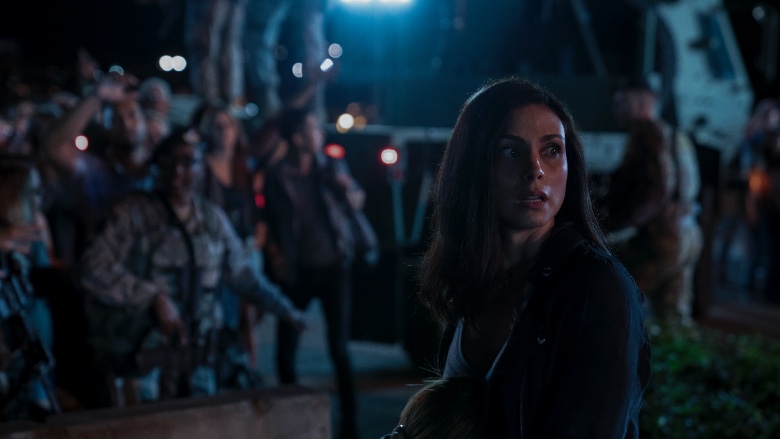
BTL: What about working in Atlanta? They obviously shoot so many films there, and was that your first time working there before?
Waugh: I’ve worked in Atlanta before but not like an entire picture like that. They’re great. It’s funny, because the United States now between New Mexico and Louisiana, and now Atlanta, I’ve seen North Carolina, you see so many familiar faces when Los Angeles was really kind of going down. There wasn’t a lot of filming going on there. You suddenly see really big crew people and different departments living in New Orleans or they’re living in Shreveport. Then suddenly, they moved to North Carolina and now Atlanta. Atlanta is literally like “L.A. South” or “New York South.” I can’t believe the amount of crew there that’s migrated from the places where we used to film that just don’t film anymore like that.
BTL: I have noticed that the locations where movies are being made is changing a lot. I used to go to Vancouver all the time, but then it was New Mexico, and no one really knows where the next place is that they’ll offer the best incentive.
Waugh: I can’t remember how many productions were going on at one time in Atlanta, but it was astounding.
BTL: Vancouver is the same, mainly doing television there, but I’ve been at Below the Line for a few months, and I’ve been following COVID protocols and all the stops and starts in Vancouver quite a lot.
Waugh: Look, I’m very blessed for what I do, but I’m kind of tired of filming in places where I feel like I keep going to the tax incentive areas to film versus where you should be filming it. It’s been fun for Kandahar to be in the Middle East and shooting the Middle East for the Middle East. The thing that’s interesting about here is the Kingdom of Saudi Arabia right now, they only have 500 cases a day in the entire kingdom. It is a massive country. What’s interesting about it is, do I love living in a democracy? Absolutely I do, but you’re also seeing the downfall of that with COVID where you’ve got too much mixed messaging going on in the US. You got one side saying that we’re all gonna die and put a hazmat suit on, and the other side saying it’s a hoax. When you get to a place like this… masks are mandatory. They take your temperature everywhere you go. When you walk into a restaurant, you walk into the gym, they’ve got hand sanitizer everywhere. There’s a process, and I will tell you this, I’ve gone to the malls, I’ve gone out in the streets, I’ve been in cars, and everybody’s totally safe, because they’re all doing the protocols. It just shows you we can live with it. We can work with it. We’re gonna do all of our protocols on set. We’re going to do all the PCR testing and the different bubbles that people are doing. (Note: You can read more about this in the aforementioned “Back to Work” piece.)
BTL: I was curious if a lot of the crew for Greenland was the same as the one you used for Angel Has Fallen, and I did notice you work with the same DP, Dana Gonzales, going back to Felon, as well as Composer David Buckley. Can you talk about moving from that production into the one for Greenland?
Waugh: Yeah, it’s interesting, because I’m working more internationally now. When I was doing all of my American movies, meaning domestic productions, Dana Gonzales and I, we’ve probably shot for over 15 years together. I went to England to do Angel as Fallen and Jules O’Loughlin has just worked with the same company when they did The Hit Man’s Bodyguard and had great success, and I really like Jules. So Jules came on to Angel has Fallen, and that’s where I met David Buckley, the composer, and just really hit it off with him and brought him on to Greenland. He did an amazing job on Greenland, and we’re gonna do Kandahar together.
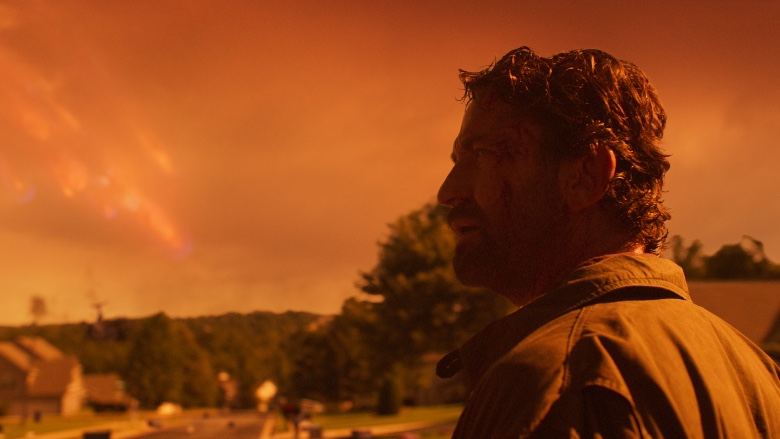
BTL: To me, it seems like the best idea is to work with people you’ve worked with before, so for instance, you’re doing a third and fourth movie with Gerry. Just to do one movie with someone and never work with them again never really made sense to me.
Waugh: I agree with you. I’m really blessed to have Gerry in my life. He’s a wonderful human being to start with. just a really great guy. We’ve become very close, good brothers, and we’re really good collaborators. We push the sh*t out of each other, I’ll tell you that, but in a very constructive way, not in a deconstructive way, where we really want to raise the bar together. I look back at even the way that I grew up in the business, and you watched filmmakers and stars. It was about a body of work that they achieve not that one-off. I feel like Gerry and I can have that — go three in a row like this. I know it won’t be the last one. We’ll definitely have a lot more gas in our tank that we want to work together on. It’s fun to have somebody like that on that other side of the camera. I’ve never had any aspirations to be an actor, that’s for sure, and he’s a hell of an actor and a movie star. So it’s great to have somebody like that, where we can keep building these stories together and try to do something different.
BTL: You also can throw him into some straight-up action, and even though you wouldn’t expect it, there is a really cool physical combat scene in Greenland.
Waugh: Yeah, he’s super coordinated, an extraordinary athlete, Gerry. Some people are just not that coordinated, or don’t have that kind of DNA, and he does. He’s not only a tremendous actor, but I could put him in so much of the action. I like to shoot action with the actors in it, so it feels much more real and that we’re not faking it. You get to do that with him, because you can trust him in the situations. He’s extremely gifted, and he understands choreography and he’s safe, which I think is the big thing. He really is conscientious about the people around him in the crew.
BTL: We spoke briefly about the visual effects for Greenland. While I’m sure you had some in Snitch and Shot Caller, they weren’t as obvious a big part of it. But you can’t really create a comet storm without it.
Waugh: I got a new secret weapon in my arsenal, this guy named Marc Massicotte. Marc was the Visual Effects Supervisor on Angel Has Fallen. He had worked for a Montreal vendor that we were using, and I just found somebody that was so attentive, creative, not afraid to speak up, and he’s now in my arsenal. I’ve carried him with me now onto Greenland, and now he’s doing Kandahar. He’s become a big, big part of my world where I can start talking about how to implement visual effects in a way that doesn’t betray what I’m trying to do, which is to make stuff grounded and authentic. It’s not about seeing the visual effect. It’s about hiding it and making it a part of the fabric of your movie without exposing it in a bad way. When you get somebody like that, that you trust that can bring their expertise to something, then you could start achieving stuff early on or have a plan to how to attack it.
BTL: I’ve obviously seen almost all your movies, and you’ve always kept the human aspect of any story up front, and even in Greenland, we see a lot of big set pieces and the visual effects sequences people will want to see, but you built to it by creating the characters first and made you like them before throwing them into all that stuff.
Waugh: I think that’s gonna be in all my movies. It’s about what’s the human fabric that’s in whatever we’re doing or whatever genre I’m taking on.
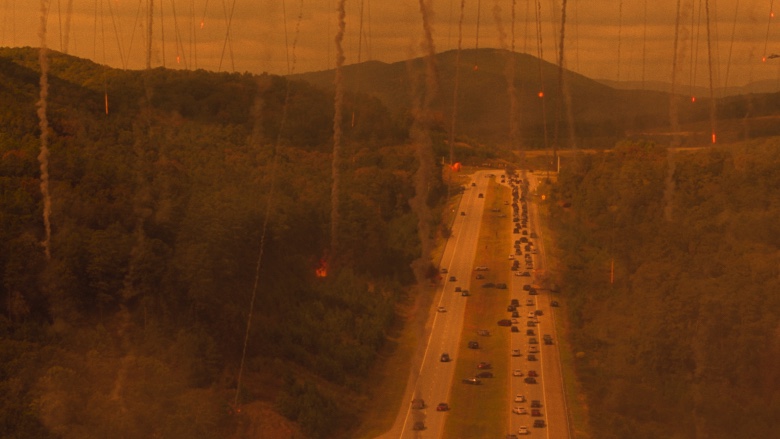
BTL: I do want to ask about one other actor, and that’s Scott Glenn, who was just amazing to see in this movie. I’m not sure when was the last time I saw him in something but when he shows up, holy crap.
Waugh: He’s killer. I’ve been very blessed lately to work with Nick Nolte and then Morgan Freeman and Sam Sheppard — God rest his soul – and now to get to work with Scott Glenn. I just fell in love with him. What a great human being and he really understood what we were trying to do, about what the message of the movie was. When he walked on set, you felt it. You felt that kind of paternal feel and that comfort feel you felt with him. You weren’t intimidated by him. You revered him and you were in awe of him, but he has such a warmth to him that you just feel like he’s your favorite family member that you don’t want to say goodbye to. It was like that when he was done; everybody was sad. It happened with Morgan Freeman, it happened with Nick Nolte. I love these old guys. I hate to call them old but they are the old farts that do it right and they’ve got this great body of work. They don’t need to do it anymore, they really don’t. They’ve proved it all, they’ve been there done that, but they still do it, because they love it, and their passion permeates everybody. You feel like if they’re at their age with that body of work and those resumes and yet, they still come with a passion. Stop complaining, just do your damn job.
BTL: They also bring a gravitas to a movie, because when you have someone with so much experience, they can literally just go into a scene and make it perfect. I also wanted to talk a little more about doing post in COVID, because I’ve spoken with people who set-up an iPad Pro for color-grading. Were there any benefits to doing post remotely?
Waugh: No, I don’t do anything remote, and Technicolor figured that out and backed me. I was the only person on the Technicolor lot, at Paramount mixing, because I was not gonna do it remotely. I was the only one in the entire building at Sunset Gower color correcting. I refused to do it remotely. I know what that’s about. It’s not good. Didn’t mean I didn’t review things on an iPad Pro and look at like the HDR version and certain things, but when it came to theatrical color and the Rec. 709, I was at Technicolor in the room.
BTL: You already mentioned that Greenland opened in Saudi Arabia, so I imagine that you’ve had a chance to see the movie on a screen with an audience, too?
Waugh: SPX was gonna get the AMC Theater in Austin, Texas to have me approve the Dolby Vision, and I had to wait six weeks for AMC to even let my wife and I in the theater. Finally, we were the only ones who walked in and got to sit in our own theater in Dolby Vision and watch it, and that was awesome. To me, Dolby Vision now is by far the best theatrical format there is. I think it’s astounding.
BTL: I’ve seen two movies in a theater in the last nine months. I’m amazed that stuff can still look and sound as good as it does in theaters when the people doing point don’t necessarily have the theaters to test them out.
Waugh: Look, I’m not unique. We all make theatrical movies to be a theatrical experience. Everything I do, I’m thinking of the theatrical experience, especially the way I’m pushing sound around and creating environments and so forth. The nice thing is that most people’s home theaters now and their environments, or even they just have a Bose Soundbar or something like that, it’s got a pretty good way of trying to give you at least a feel of what we were going for versus just two stereo speakers or a mono. It’s nice that people are getting a little bit more of an experience of what we’ve been trying to do, and the resolution just keeps getting better and better for TV. Look, we’re coming out December 18, a good holiday movie. You’re sitting with your drunk uncle, and you’ll have a movie to watch.
Greenland is now available to watch through STXfilms’ On Demand on many digital and cable platforms.
All photos courtesy of STXfilms.





